|
Leonard Nimoy
is Mr. Spock: Leonard Nimoy speaks on: Margitta asked Leonard Nimoy on parallels in his personal life
to the 'Final Plane': I test myself constantly. I'm constantly trying to put myself into new and challenging situations, to see what I can learn about it, how I can develop myself, hopefully to improve myself and to have more to offer to the world. I think that's a important part of my life. Constant self-development is certainly a great important part of my life. Leonard Nimoy on his favorite Star Trek episode: My favorites fall into two distinct categories: A good example for the first category is the two parter "The Menagerie". It was one of the most important pieces of television ever done. It was wonderful television and great classic Star Trek to boot. In "The Menagerie" Captain Pike was severely injured and Spock was court-martialed. I also think that "City on the Edge of Forever" was a wonderful, wonderful episode. It was very well written and we had a lot of fun (during the filming). Leonard Nimoy on the duality of Spock's nature: Spock had a kind of internal life that I found very interesting. Half Vulcan, half human. Human mother, Vulcan father. Wanting to live as a Vulcan, wanting to lead a logical, intellectual life. But being half human having an emotional, irrational life. So this dreary conflict was fought. The idea was that his Vulcan mentality was constantly trying to control him, to hold onto him. Control his emotional life. I found it very interesting. And I found it very interesting because most humans have the same experience. We go through this kind of process all the time.
That's a very human condition. We all have this experience. And this is the condition that people can relate to in Spock. We recognize ourselves in Spock. "In The Naked Time" for the very first time in Star Trek we saw both sides. We saw Spock functioning as a logical Vulcan. But when he was affected by a disease he started to loose control and became terribly emotional. He began worrying about his relationship with his parents and with his mother in particular: "My mother, I never told her I loved her." stood in stark contrast to "I am a scientist, I must control myself." I thought it was a very important episode. And shortly after that episode aired, which was rather early in the first season of Star Trek, the public response was enormous. I felt that was because people identified with the dilemma and understood that we as humans are constantly dealing with this issue. So I thought that was a very good episode. Leonard Nimoy on the origin of the Vulcan neck pinch: There was an episode called "The Enemy Within" which was essentially a 'Mr. Jekyll and Mr. Hyde' type of story. It dealt with two personalities within one character, in this case a 'good' personality and an 'evil' personality. Captain Kirk, because of a malfunctioning transporter, is split into two characters: there is a good Kirk and a bad Kirk. The 'good' Captain Kirk was very neat now, and scared. He is confronted by the very 'evil' Kirk, who is trying to kill the 'good' Kirk. There was a scene written were Spock comes up behind the evil Kirk and hits him over the head with the butt of his phaser. And I said:
For years people have been asking me now to teach them how to do that... Leonard Nimoy on Vulcans sexual behavior: Vulcans, how can I say this, are there any younger
people here in the audience?
Vulcans come into heat once every seven years (Sample of Vulcan mating song). True. Vulcans are ready to mate. You know that. Amok Time is a story where Spock needed to mate. Spock, we discover, had been betrothed, since he was a child. To a Lady In Waiting on Vulcan, and he has to get back there for these wedding rituals. So this was the first time that we are going back to Vulcan. And when we landed on the planet, there were three of us. There was Kirk, McCoy and Spock, and we were waiting out on the dessert plane on Vulcan, waiting for the wedding procession to come. And the procession comes out and is led by some people carrying a lady in a sedan chair. The ladies name was T'Pau. A regal, dignified Lady. Playing the matriarch of the Vulcan planet. And when they brought her up and sat her down it was written that Spock approaches her and says, whatever, she says: "Welcome home Spock", and Spock says something like: "It's nice to be here." Leonard Nimoy on the legend of the Vulcan greeting sign: I was very anxious to try to introduce Vulcan culture. I'm always looking for Vulcan culture. It's like the neck-pinch and the Mind-Meld. I was always looking for a Vulcans view. And I said to the director we should find something special that Vulcans do. He said: "What do you mean?", and I said: "Well, humans shake hands when they meet. Military people salute each other. Asian people bow to each other, when they meet. These are certain rituals, customs, that have to do with certain cultures. We must find something that Vulcans do when they meet. And he said "Alright, what do you have in mind?" So, it is true, I was brought up and grew up in an orthodox Jewish family. And when we went to the holiday services each year, high holiday services, Rosh Hashana which is the jewish New Year, and Yom Kippur, which is the jewish Day of Atonement, we would go to services together. And I'd sit with my father, and my brother and my grand-father. In the orthodox service male and female sit separately. So I sat there with the men in my family. There comes a point in the service where a group of men who are known as Cohanim (they are the priestly tribe of the Hebrews) bless the congregation. They bless the congregation with the same prayer that comes out of the old (*) testament. The words in English are: "May the Lord bless you and keep you. May the Lord pass his (*) strength upon you. May the Lord turn his graciousness onto you and grant you peace." I am sure you are familiar with these blessings. And they say it in Hebrew. When they say
it to the congregation at that point in the service it is a extremely
spiritual moment. I want to try to describe to you (*), what
I experienced when I saw that. They cover their heads with a
prayer shawl. And the congregation looks away, does not look
at it. I remember when I was about six or seven years old and
my father said to me don't look. The congregation all sits with
their heads averted and these men (Cohanim) are up there doing whatever
they do. But it intrigued me. It struck me as something very spiritual and very special and I wanted to learn how to do that. Well, I spent a lot of time practicing. So I could do it left hand, right hand, anytime, anyplace. I didn't have any idea what it meant. I didn't even know why I wasn't supposed to look. I found out later you are not supposed to look because at that moment when they say that prayer "May the Lord bless you and keep you...", legend tells us that the spirit of G*d enters the sanctuary. To bless the congregation. We are told that for a human to see G*d is too overwhelming. That a human could die, that human might not survive. So it's a legendary thing that the congregation looks away and doesn't watch this happening. That's why you don't look. Now the shape of the famous hand-gesture (middle and ring-finger spread, thumb spread from index finger) happens to be the shape of a letter in the Hebrew alphabet. The letter is called "Shin". And the letter "Shin" is the first letter in the Hebrew word "Shadai". "We hail thee Almighty" that's the translation. So the sense is, when they use that symbol they are invoking the idea of a symbol and not His name to bless the congregation. And that's the tradition when they do that. I didn't know it at the time, I learned it much later. So, at the time when I was doing "Amok Time" we were looking for this Vulcan thing. I said to the director: "How about if I do that?" (What is now known as the Vulcan handsign). So, he didn't have any idea what it was. He did not and it didn't matter. He said "Alright. We'll do that." Now to get back to the Lady, the actress Celia
Lovsky, a wonderful actress, who was playing T'Pau. And we said
to her: "This is what we are going to do." The director
said: "When Leonard approaches you he will do the Vulcan thing.
And you will do the same." Now, about a week after that show was aired the very first time I was in a city called Cleveland. I was doing an appearance. I was being driven by car and we stopped at some traffic lights. And a car pulled up next to us. A young lady in that car recognized me. She got excited and waved at me with the Vulcan handsign. I was very touched by that. I thought: "That's wonderful that somebody is responding to this." And I rolled down my window. I asked her: "Can you do it with your left hand?" And she tried and didn't succeed entirely. She said "I'm sorry, but I speak it with an accent." Leonard Nimoy on the question if Spock will appear in another Star Trek movie: This is very difficult for me, emotionally, it really is. I miss Spock, I really do. I miss playing Spock, I miss being Spock and it means a lot to me that people would like to see more of Spock. It really does. It means a lot to me. And I find myself constantly having to disappoint people. Because it has been many years now since I've performed Spock, and I doubt that I will again. Not because I don't want to, I have not been asked. That's the simple truth. Each time that I have been asked to play Spock, I have. Star Trek has moved into all other kinds of life. It has taken on all other kinds of life. Generations, Deep Space 9, three or four movies with the new Next Generation cast, and there has been no function for Spock in any of those projects. I feel it is unlikely that I will be hearing from the producers. I thank you very much for your question. Leonard Nimoy and Star Wars You are all aware that Star Wars is coming again? Then in 1977, 22 years ago, George Lucas presented a film called "Star Wars". And Star Wars was an enormous success all over the world. I went to a theatre to see it and I was taken with this great film. The audiences reaction was extraordinary. And I thought: "I think I'll be getting a call from Paramount." And sure enough, in a few days after Star Wars opened somebody at Paramount must have said "Well, don't we have something like that called Star Trek? You remember?" And they started calling us and we made the first Star Trek movie in 1979. It was two years later. And then we have a whole new life. There was Star Trek 2 with Ricardo Montalban (the big chest), and Star Trek 3 they asked me to direct, Star Trek 4 they got me to direct, Star Trek 5 Bill Shatner did, Star Trek 6 they asked me to produce it. We had a wonderful time. But since then there have been no invitations doing more Star Trek movies. It's onto the cast from the "Next Generation". So I do believe that we've seen the end of Spock. We had some very heavy rain this fall. And a small tree in our yard was torn up. And I discovered something I had forgotten for many years that when we planted this tree in 1966, 33 years ago, I discovered a letter that I had planted in the ground in a time-capsule. That I had predicted the future I was talking to you a few moments ago. This is the letter, I brought it with me, and I read you what I wrote at that time. People ask me if I have special mental power. People do ask. I think this is the proof. This is what I wrote in September 1966: "I predict that the Star Trek series will last for three seasons. I predict it will have many re-runs. There will be several Star Trek movies and at least three additional series." This is dated September 1966! 33 years ago! "I predict that I will appear at a convention in Bonn in 1999." (laughter) The Lady over there... we may have some
doubters in the audience... I want a witness. What is your name?
"Biddy." Nimoy: "Have we ever met before?"
Biddy: "No." Further reading:
|

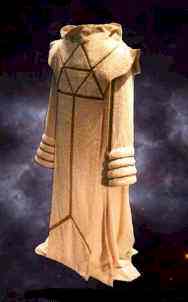
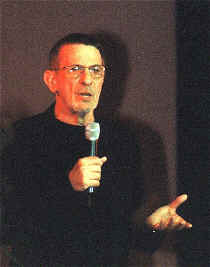 How
many times have you been in a situation where your emotions take over
and later you say: "Oh, I wish I hadn't done that. I wish I had
said the right thing, I wish my emotions hadn't controlled me. I wish
I had controlled myself better."
How
many times have you been in a situation where your emotions take over
and later you say: "Oh, I wish I hadn't done that. I wish I had
said the right thing, I wish my emotions hadn't controlled me. I wish
I had controlled myself better."  So
I said: "Well, Spock is a graduate at the 'Vulcan Institute Of
Technology'. And he has studied the human anatomy. And
he knows exactly were the pressure points are on the human body.
He has this special energy from his fingertips. And if you apply
that energy, the force from the fingertips on those pressure points
will render a human being unconscious. The director didn't understand
what I was talking about. I explained it to William Shatner
and he understood. When we finally did the scene, instead of
hitting him over the head with my gun, I came up behind Bill Shatner,
(as he was playing Captain Kirk obviously) and did pinch him
in the neck. Bill fell to the floor. And that was how the Vulcan neck-pinch
was born.
So
I said: "Well, Spock is a graduate at the 'Vulcan Institute Of
Technology'. And he has studied the human anatomy. And
he knows exactly were the pressure points are on the human body.
He has this special energy from his fingertips. And if you apply
that energy, the force from the fingertips on those pressure points
will render a human being unconscious. The director didn't understand
what I was talking about. I explained it to William Shatner
and he understood. When we finally did the scene, instead of
hitting him over the head with my gun, I came up behind Bill Shatner,
(as he was playing Captain Kirk obviously) and did pinch him
in the neck. Bill fell to the floor. And that was how the Vulcan neck-pinch
was born.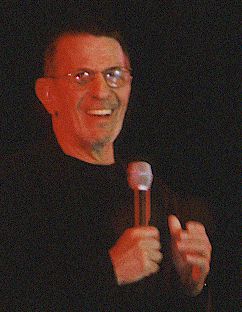
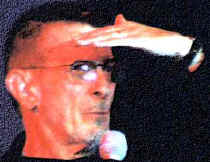 And I sensed that there was something very magic happening.
Something very special. And I was curious. So I peeked.
I was not supposed to, but I peeked. And what I saw was these
men covered by prayer shawls. And they had their hands out.
Saying this prayer in Hebrew. They had their hands out towards
the congregation like so. I had no idea why they were doing
that.
And I sensed that there was something very magic happening.
Something very special. And I was curious. So I peeked.
I was not supposed to, but I peeked. And what I saw was these
men covered by prayer shawls. And they had their hands out.
Saying this prayer in Hebrew. They had their hands out towards
the congregation like so. I had no idea why they were doing
that.
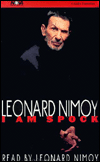 I
AM SPOCK
I
AM SPOCK
